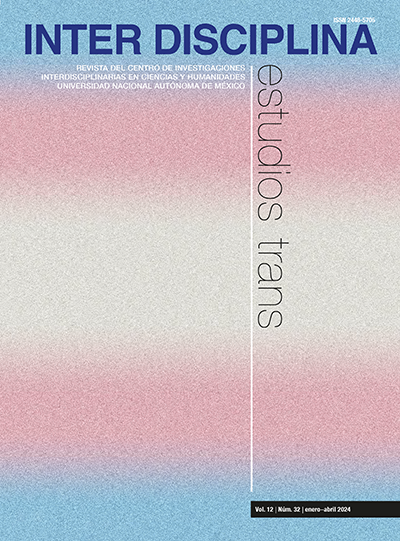A transfeminist critique of unconditional deliberationism in science and politics
Main Article Content
Abstract
In recent years, there has been an increase in the visibility of trans people. Although this gain in visibility has allowed greater recognition of the problems suffered by this community, it has also generated disagreements in the public sphere between trans activists and trans-exclusionary positions. These controversies have given rise to strong communication breakdowns between both sectors. In this context deliberation has been invoked as the only mechanism capable of managing and resolving this set of controversies. However, some supporters of deliberation have paid insufficient attention to the asymmetries underlying these disagreements, leading to what is here characterized as unconditional deliberationism. My goal in this paper is to show under what scenarios a deliberative exercise can be successful. As will be shown, the current state of the discussion is not ideal for such an exercise; if our hopes are placed on argumentation, it is necessary to dismantle the marginalization suffered by trans communities in order to prevent the collapse of the deliberative exercise into a mere simulacrum.
Downloads
Article Details
Citas en Dimensions Service
References
Almagro Holgado, M., Navarro Laespada, L. y De Pinedo García, M. 2021. Is testimonial injustice epistemic? Let me count the ways. Hypatia, 36(4): 657-675.
Almas Cautivas A. C. 2019. La situación de acceso a derechos de las personas trans en México: problemáticas y propuestas. México: US Embassy Mexico.
Arango, R. 2020. Decisionismo y deliberación: dos formas de representación política. Teología política e imagen, 92.
Bayer, R. 1987. Homosexuality and American psychiatry: the politics of diagnosis. Princeton University Press.
Brandom, R. 1994. Making it explicit: Reasoning, representing, and discursive commitment. Harvard University Press.
Brown, W. 2017. El pueblo sin atributos: La secreta revolución del neoliberalismo. Barcelona: Malpaso Ediciones SL.
Butler, J. 1997. Excitable speech: A politics of the performative. Nueva York: Routledge.
Collins, H. y Evans, R. 2008. Rethinking expertise. En Rethinking expertise. University of Chicago Press.
De Lora, P. 2019. Libertad académica: mi experiencia (trans)formativa. Letras Libres, año XXI, 252. https://www.letraslibres.com/espana-mexico/politica/libertad-academica-mi-experiencia-transformativa.
Dotson, K. 2011. Tracking epistemic violence, tracking practices of silencing. Hypatia, 26(2): 236-257.
Epstein, S. 1996. Impure science: AIDS, activism, and the politics of knowledge. Los Angeles: University of California Press.
Fraser, N. 2021. Rethinking the public sphere: a contribution to the critique of actually existing democracy. En Public Space Reader. Nueva York: Routledge, 34-41.
Funtowicz, Silvio O. y Ravetz, Jerome R. 1993. Science for the post-normal age. Futures, 25(7).
Gallardo, J. 2011. Deliberación democrática: respuesta a Cristian Pérez Muñoz. Revista Uruguaya de Ciencia Política, 20(1): 165-177.
Goldman, A. y Whitcomb, D. 2011. Social epistemology: essential readings. Oxford University Press.
Guerrero Mc Manus, S. 2019. Lo trans y su sitio en la historia del feminismo. Revista de la Universidad, 846: 47-52, marzo.
Guerrero Mc Manus, S. 2020. Las personas trans en México. Entre el derecho y la violencia. Gaceta Conbioética, año X, 38: 8-11.
Guerrero Mc Manus, S. 2021. Infancia, adolescencia y diversidad sexual. Entre los derechos y los pánicos morales. En Infancias y adolescencias libres y diversas. México: Cuadernos Cátedras-Cultura UNAM, 9-18.
Guerrero Mc Manus, S. y L. Muñoz Contreras. 2018a. Ontopolíticas del cuerpo trans: controversia, historia e identidad. En Raphael de la Madrid, L. y Cíntora, A. (eds.), Diálogos diversos para más mundos posibles. Ciudad de México: UNAM-IIJ.
Guerrero Mc Manus, S. y L. Muñoz Contreras. 2018b. Epistemologías transfeministas e identidad de género en la infancia: del esencialismo al sujeto del saber. Revista Interdisciplinaria de Estudios de Género de El Colegio de México, 4: e168, mayo14. http://dx.doi.org/10.24201/eg.v4i0.168.
Habermas, J. 1991 [1962]. The structural transformation of the public sphere: An inquiry into a category of bourgeois society. Boston: The MIT press.
Haraway, D. 2020. Situated knowledges: The science question in feminism and the privilege of partial perspective. En Feminist theory reader. Nueva York: Routledge, 303-310.
Harding, S. 2013. Rethinking standpoint epistemology: What is “strong objectivity”? En Feminist epistemologies. Nueva York: Routledge, 49-82.
Kuhar, R. y Paternotte, D. 2017. Anti-gender campaigns in Europe: Mobilizing against equality. Rowman & Littlefield.
Kuhn, T. 2000. The road since structure. Philosophical essays, 1970-1993, with an autobiographical interview. Chicago: University of Chicago Press.
Longino, Helen. 2002. The fate of knowledge. Princeton: Princeton University Press.
Marey, M. 2011. Democracia agregativa y deliberativa: círculo práctico inevitable. Ideas y valores, 60(147): 153-175.
Nussbaum, Martha. C. 2012. Crear capacidades. Propuesta para el desarrollo humano. México: Paidós Estado y Sociedad.
O’Connor, C. 2019. The origins of unfairness: Social categories and cultural evolution. EUA: Oxford University Press.
Pérez Ransanz, A. R. 1999. Kuhn y el cambio científico. México: FCE.
Polanyi, M. 1962. The republic of science: its political and economic theory. Minerva, I(1): 54-73.
Popper, K. 2014. Conjectures and refutations: The growth of scientific knowledge. Routledge.
Rawls, J. 1993. Political liberalism. Nueva York: Columbia University Press.
Rawls, J. 1995. Teoría de la justicia. México: FCE.
Sentiido. 2021. Transfeminismos en América Latina. Resumen de hallazgos. Bogotá: Heinrich Böll Stiftung.
Serano, J. 2020. Whipping girl. El sexismo y la demonización de la feminidad desde el punto de vista de una mujer trans. Madrid: Editorial Ménades.
Sunstein, C. R. 2006. Deliberating groups versus prediction markets (or Hayek’s challenge to Habermas). Episteme, 3(3): 192-213.
Turban, J. L., Loo, S. S., Almazan, A. N. y Keuroghlian, A. S. 2021. Factors leading to “detransition” among transgender and gender diverse people in the United States: a mixed-methods analysis. LGBT health, 8(4): 273-280.

Esta obra está bajo una Licencia Creative Commons Atribución-NoComercial-SinDerivar 4.0 Internacional.

